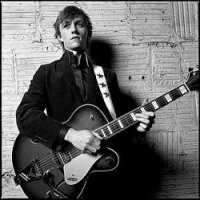Everywhere you turn in the music industry these days, people will tell you that music is in crisis. Then along comes someone like Sondre Lerche to restore your faith and whose second album, Two Way Monologue, really ought to be sub-titled ‘Crisis? What Crisis?’
Now 21, Sondre Lerche emerged from Bergen, Norway three years ago with his debut album, Faces Down. The youngest of four siblings, he grew up on classic 1980s pop and began learning the guitar at the age of eight. He wrote his first song at 14 and was playing acoustic nights in a Bergen club when he wasn’t even legally old enough even to be in there. By the time he was 17, he was signed to Virgin Records. A brace of toe-in-the-water EPs introduced him to the Norwegian charts. But the release of his debut album Faces Down, recorded in 2000, was deliberately delayed until after he had finished school the following year.
Ambitious, diverse and packed full of gorgeous melodies tempered with tougher edges, Faces Down was the perfect antidote to the manufactured synthetic pop choking the joy and imagination out of modern music. As impossible to categorise as you would imagine from a list of influences that included Burt Bacharach, Jeff Buckley, High Llamas, Elvis Costello, Steely Dan, Beck and Cole Porter, the album was an instant hit at home and critically well-received in Europe, Britain and America, where it made Rolling Stone’s top 50 albums of 2002. Extensive touring further enhanced Sondre’s reputation, with a Billboard review of a live show in New York praising his “gorgeous folk-pop melodies, goose-bump-generating vocals and astounding finger-work on the guitar.”
Now he’s fulfilled all the promise of his precocious debut with Two Way Monologue, an audaciously non-difficult second album of astonishing maturity and vividly melodic songs. From the fragile acoustics of the melancholic It’s Too Late to the almost symphonic variations of the title track and on to the uplifting shiny pop candy of On The Tower, it’s an album of breath-taking diversity and imagination that refreshes popular music as a creative force.
Like its predecessor, Two Way Monologue was recorded once again in Bergen by HP Gundersen and Jørgen Træen (Jaga Jazzist/ Kaizers Orchestra/ Magnet) with the same core band, known as The Faces Down. According to Sondre, they were central to the spirit of the album. “I wanted the band performance to be the basis of most of the songs. That’s what makes them shine,” he says. “We rehearsed a lot and did demos and it really paid off. The swing of the musicians playing together is probably what I’m most happy about on the record.”
Then he added two self-produced, home- recorded, non-band songs. “Overkill is not an option and I wanted to balance the record. On the first album I was into easy listening and widescreen arrangements. If it wasn’t packed with strings and synths I didn’t want to know.”
“This time I felt I’d proved I could write tidy, well-crafted pop songs. I wanted to challenge myself more and to write songs that were less predictable in structure and more relaxed. I think the songs are intrinsically richer and more diverse. But I tried to give them space to breathe. I wanted to let the air fill the songs. So I made it a bit more minimalist.”
Both sonically and lyrically, there’s plenty of finely-wrought detail. “I worked very intensly on the lyrics and I’m proud enough to print them in the booklet, which I didn’t feel comfortable about last time,” says Sondre.
Just as much attention went into the arrangements, from the accordion on Maybe You’re Gone to the pedal steel on Stupid Memory via the French horn on the instrumental Love You. But such embelishments were always for sound musical reasons, never simply for show. “The record had to be directed by my own ambition and ability and not by the budget. I was determined not to get carried away,” Sondre insists.
Which perhaps explains his insistence on remaining in Bergen, when the brighter lights of Oslo and beyond beckoned. “I can’t tell you how great the music scene is,” he enthuses. “I’m amazed at the music being made in Bergen. It’s creative and inspiring. No way was I going to New York to record when we’ve got it all back home.”
As for the influences, anyone looking for clues can find them in the small print of the ‘thank yous’ in the album’s liner notes - the Beach Boys (“but more Surf’s Up and Sunflower than Pet Sounds this time”), Prefab Sprout’s Paddy McAloon, the Brazilian composer Milton Nascimento and Brian Wilson collaborator Van Dyke Parks’ legendary cult album, Song Cycle. The result is an album that sounds like little else in the contemporary pop firmament, although Rufus Wainwright and Ed Harcourt - two other adventurous singer-songwriters who refuse to fit snugly into the conventional troubadour mode - are perhaps the closest comparisons.
“I was nervous about whether these songs were as good as the first record,” Sondre admits. “Faces Down came from that first uplifting rush of spontaneous inspiration in discovering that you can write songs. But you can never go back to that place. After that, you have to work at the gift you’ve been given. You’re more self-conscious and you have to fight back.” On Two Way Monologue, Sondre Lerche emerges victorious.
“It’s all about the song,” he says. “It’s not about anything else. If I don’t feel strongly about the song I couldn’t record it.” Crisis? What crisis?
